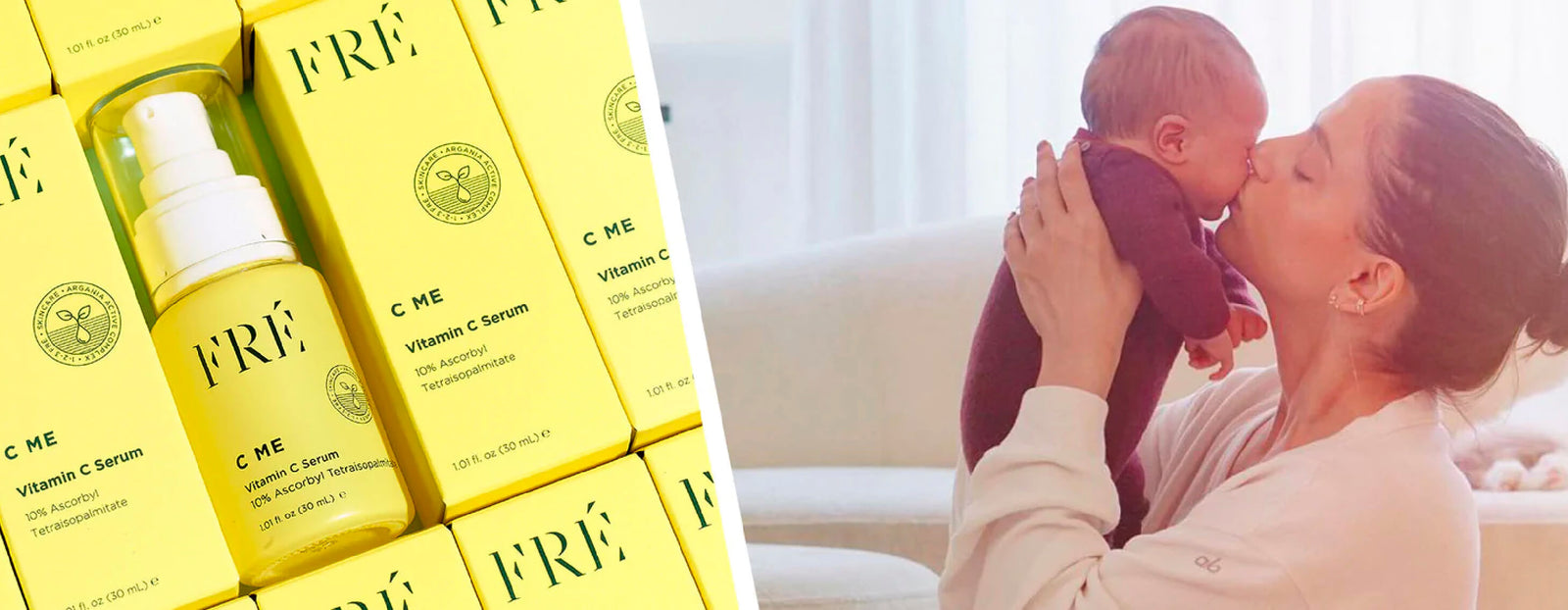
25% OFF + FREE SHIPPING ON YOUR FIRST ORDER. LEARN MORE.
Shop All
Skincare for Pregnancy and Postpartum
by Lorisa Hasenbush May 01, 2022

For nine months, your skin stretches and morphes as your baby grows inside you. Then, your skin goes through intense stress as you give birth, but as a result, you hold your sweet baby in your arms. The next months are followed by round-the-clock feedings and diaper changes, and your skin (as well as the rest of your body) has to keep up. Let’s talk about the big skin changes during pregnancy and postpartum and how to care for your skin during these times.
Big hormonal changes take place during pregnancy and postpartum that can cause some skin issues:
- Darkening of freckles, moles, nipples, areolas, and labia is normal during pregnancy. Usually, the darkened areas will return to their original color within months after delivery.
- Linea nigra is a darkened vertical line in the middle of a pregnant belly, passing through the navel. It usually fades shortly after giving birth.
- Melasma, also known as the “Mask of pregnancy,” causes dark splotchy spots on the face, most commonly on the forehead, cheeks and over the upper lip. It will get worse if you are exposed to UV radiation without sunscreen. It typically goes away within three months postpartum.

Melasma will get worse if you are exposed to UV radiation without sunscreen.
- Breakouts and acne are common during pregnancy as the sebaceous glands secrete more. The more sebum on your face, the bigger the risk that it will clog your pores, leading to acne or worsening of pre-existing acne. As your hormones calm down postpartum, your sebaceous glands will become less active and the acne should subside.
- Stretch marks can appear as the skin is stretched in all directions during pregnancy. They most frequently occur on the abdomen, breasts, arms and legs. Most stretch marks fade as your body shrinks back to a non-pregnant state, but they will not disappear entirely.
- Varicose and spider veins can form on the legs as a result of weight gain and pressure in the venous system. Typically, varicose and spider veins disappear 3 to 4 months postpartum.
Hair and nails can also go through changes during pregnancy.
- Hair may grow thicker during pregnancy and in areas where you didn’t have hair previously. Around 3 months after childbirth, you may notice hair loss; it is caused by hormones returning to normal levels. This change helps the hair to return to its normal cycle of growing and shedding. By 3 to 6 months postpartum, hair should grow normally again.
- Nails may grow faster or split and break more easily during pregnancy. After giving birth, they return to their normal growth rate.
In general, it is important to be aware of the ingredients in your skincare products, but you should be cautious when you are pregnant or breastfeeding. Avoid products containing retinoids and hydroquinone.
Follow this skincare routine for healthy pregnant and postpartum skin:
Step 1: Cleansing
Morning and night, use PURIFY ME to cleanse your face. Jojoba beads remove excess oils and dead skin cells, gently exfoliating your skin and clearing out your pores. Shea butter moisturizes without clogging pores, and aloe vera nourishes the skin.
Step 2: Nourishing skin
Apply C ME morning and night. C Me, Vitamin C serum, contains 10% Ascorbyl Tetraisopalmitate, a powerful antioxidant compound that protects and repairs damage caused by free radicals from external sources like pollution or internal sources from normal metabolism. In addition, it also acts as a depigmenting agent, reducing dark freckles and splotches.

C ME acts as a depigmenting agent, reducing dark freckles and splotches.
Step 3: Morning - Moisturizing and Protecting
Apply GLOW ME + every day. SPF is a must for everyday skin protection, even when you are pregnant or postpartum. If you have melasma, the GLOW ME +’s SPF 30 will prevent it from getting worse, and the universal tint will hide your splotchy skin tone. In addition, hyaluronic acid hydrates, while chamomile, melissa and rooibos extracts soothe the skin.
SPF is a must for everyday skin protection, even when you are pregnant or postpartum.
Night - Moisturizing and Rejuvenating
Every night, apply RECOVER ME. Hyaluronic acid and coco-caprylate/caprate hydrate skin. Tocopherol is an antioxidant that nourishes skin and repairs skin damage, while niacinamide improves the appearance of damaged skin. Lavender oil is anti-inflammatory and its scent is known to relax the senses
Hair, nails and lips care
When hair, nails or lips feel dry apply 100% Organic Argan Oil as needed. This oil has moisturizing, antioxidant, antibacterial, and anti-inflammatory properties.

Hormonal changes during pregnancy and postpartum can be rough on skin, but a consistent skincare routine that cleanses, nourishes, moisturizes and protects skin will keep you healthy and glowing.
Leave a comment
Comments will be approved before showing up.

